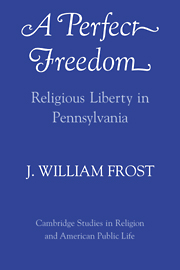Book contents
- Frontmatter
- Contents
- Acknowledgments
- Preface to This Paperback Reissue
- Introduction: The Pennsylvania Traditions of Religious Liberty
- I The Creation of Religious Liberty in Early Pennsylvania
- II Pacifism and Religious Liberty
- III The Clergy and Religious Liberty
- IV Religious Liberty in the Revolution
- V Religious Liberty and the Republic
- VI Politicians Debate Religious Liberty
- VII The Churches and Religious Liberty
- VIII The Legal Implications of Religious Liberty
- IX Religious Liberty and the Catholic and Jewish Minorities
- Epilogue: The Dismantling
- Notes
- Bibliography
- Index
IX - Religious Liberty and the Catholic and Jewish Minorities
- Frontmatter
- Contents
- Acknowledgments
- Preface to This Paperback Reissue
- Introduction: The Pennsylvania Traditions of Religious Liberty
- I The Creation of Religious Liberty in Early Pennsylvania
- II Pacifism and Religious Liberty
- III The Clergy and Religious Liberty
- IV Religious Liberty in the Revolution
- V Religious Liberty and the Republic
- VI Politicians Debate Religious Liberty
- VII The Churches and Religious Liberty
- VIII The Legal Implications of Religious Liberty
- IX Religious Liberty and the Catholic and Jewish Minorities
- Epilogue: The Dismantling
- Notes
- Bibliography
- Index
Summary
In one sense all denominations and all ethnic groups in Pennsylvania were minorities. No nationality or church had numerical dominance, and during the history of the colony and the state virtually every group complained at some time that it was mistreated. Still, after 1783 the mainline Protestant churches – Presbyterian, Lutheran, Reformed, Episcopalian, Baptist, and Methodist – established the tone of society, and their members occupied prominent positions in government, commerce, and education. Grumblings from these denominations meant that they perceived some threat to their hegemony. The sectarian churches – Friends, Moravians, Amish, and Mennonites – enjoyed prosperity and the prestige of priority of settlement in Chester and Bucks, Lehigh, and Lancaster counties. Because of their small numbers the sects' distinctive beliefs and practices did not threaten the major evangelical denominations' political or cultural dominance, and they enjoyed a quiet existence among the world's peoples.
Jews, the only organized non-Christian population in the state, wished to be free to practice their distinctive rituals and not feel treated as aliens or second-class citizens. Roman Catholics sought during the Revolution to remove the British imposed barriers to becoming citizens and full political participants. In the early Republic Jews and Catholics enjoyed good relations with their Protestant neighbors, who attended their services on special occasions, donated to building funds, and granted them legal equality.
- Type
- Chapter
- Information
- A Perfect FreedomReligious Liberty in Pennsylvania, pp. 144 - 158Publisher: Cambridge University PressPrint publication year: 1990



